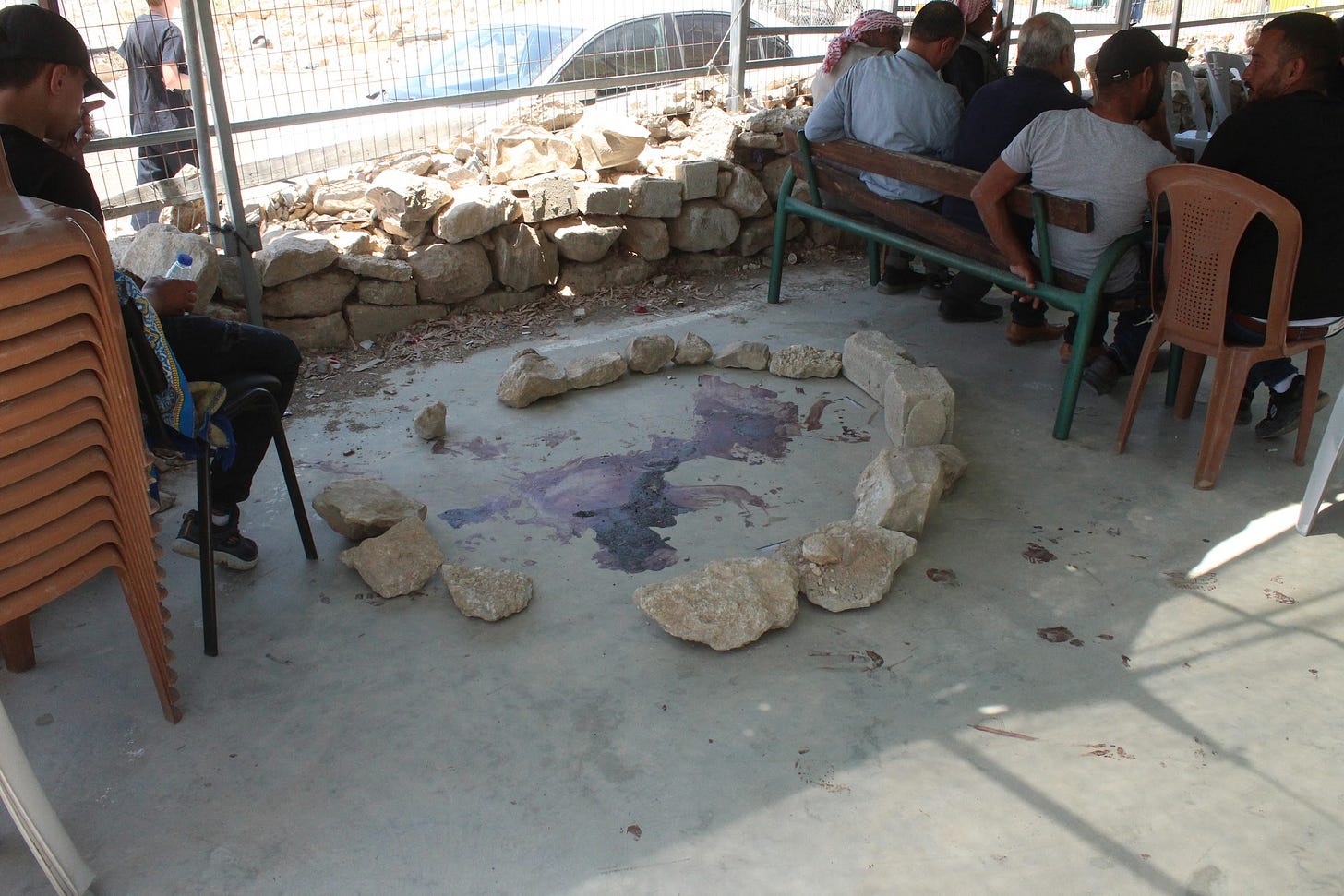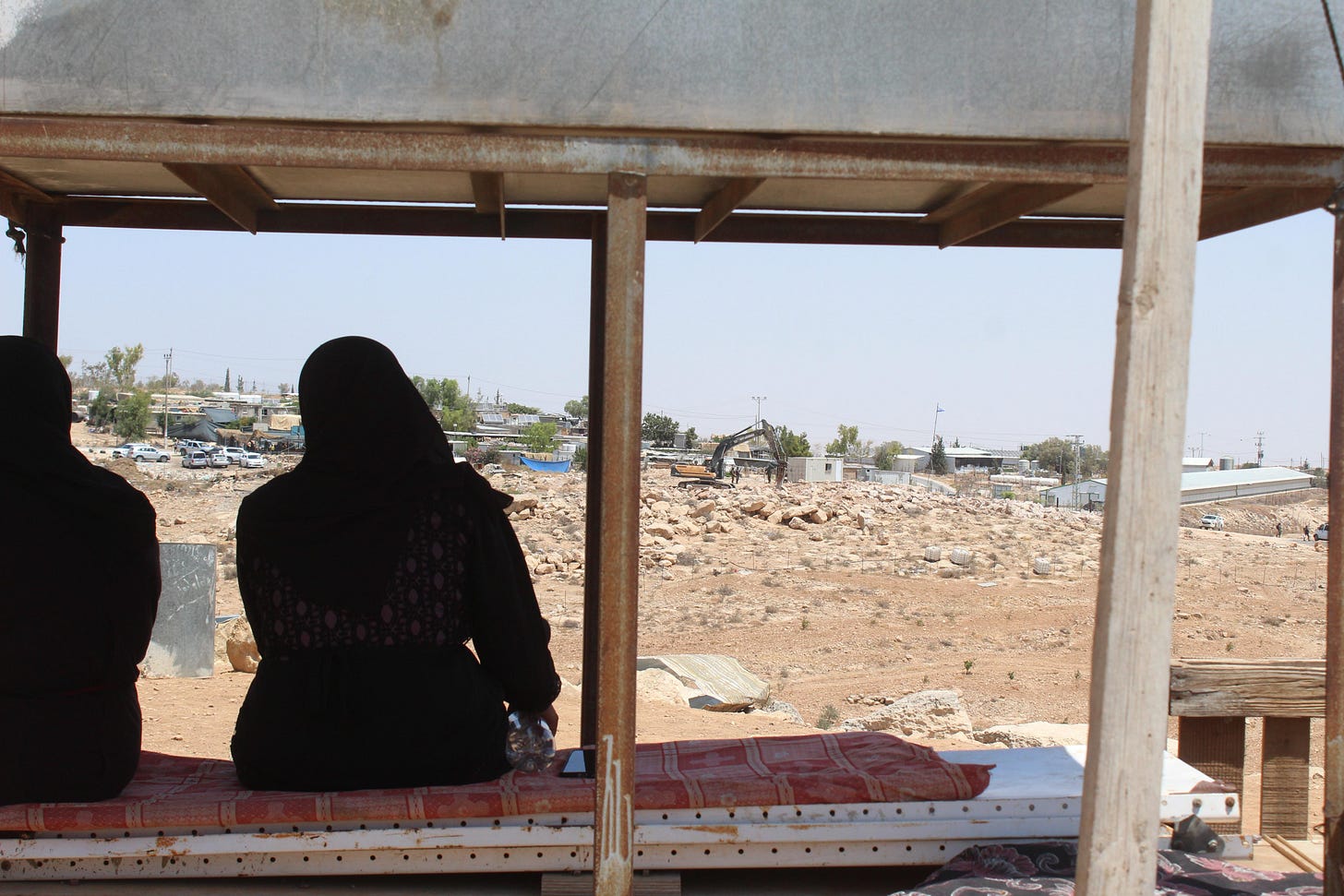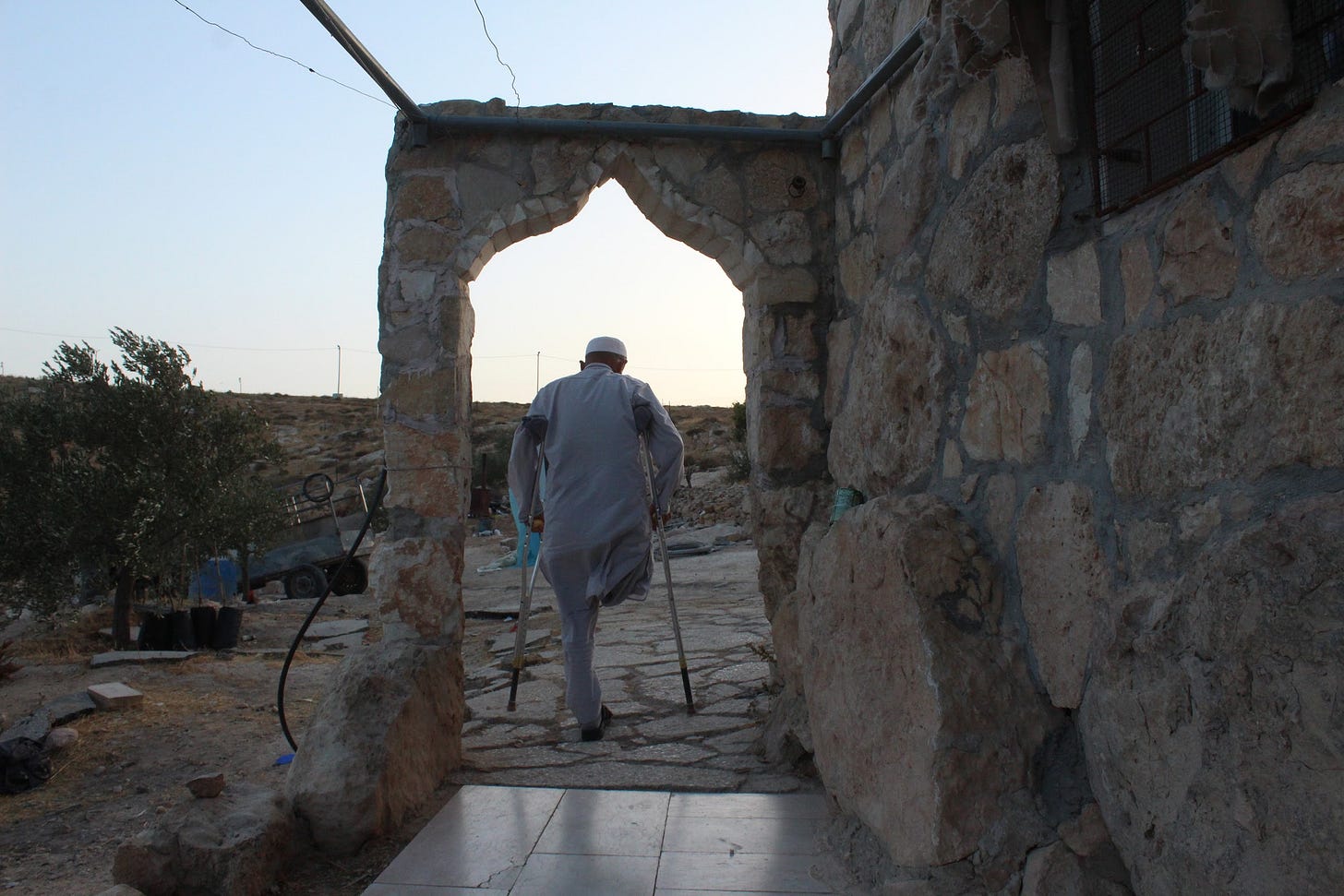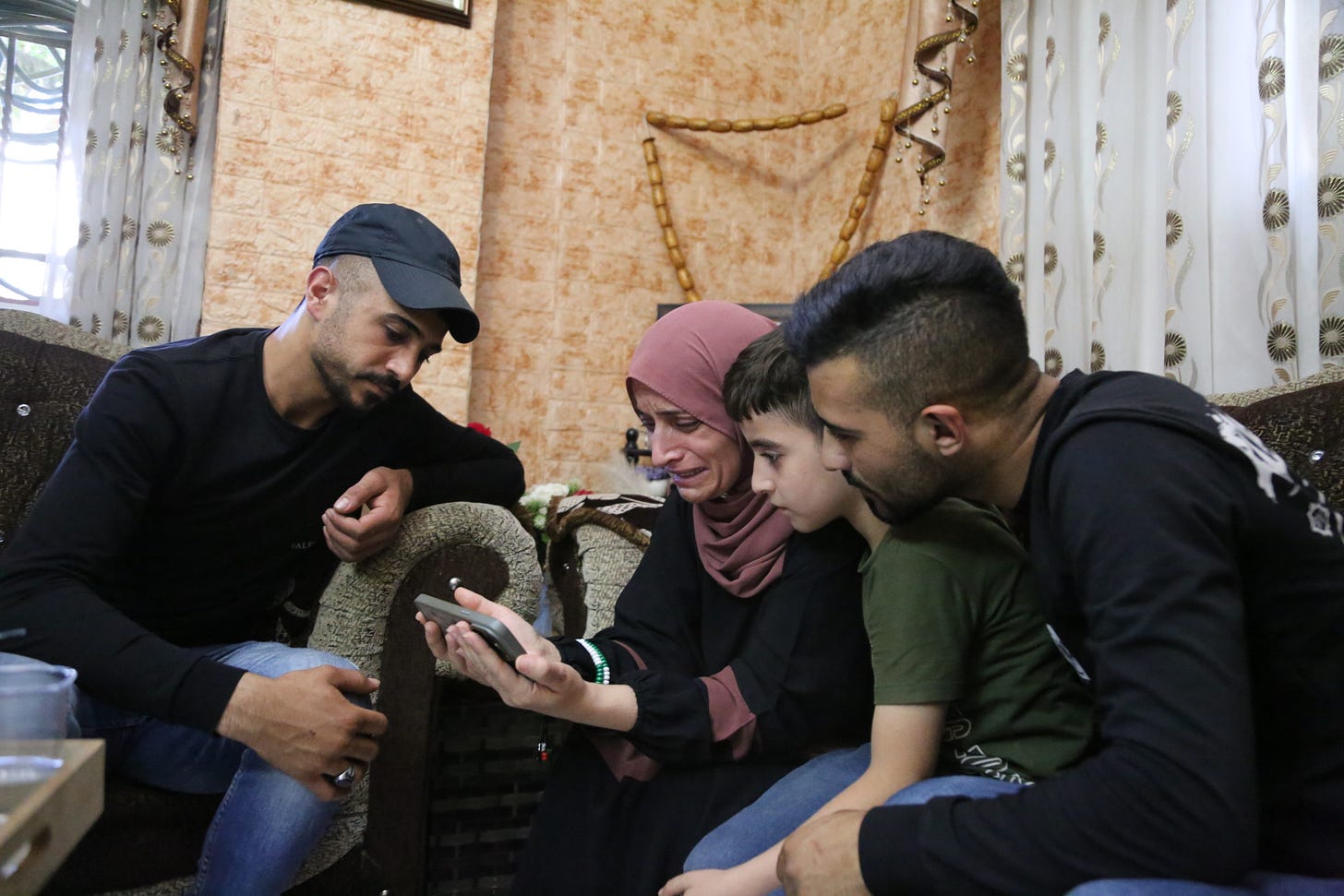 Awdah Hathaleen with his students in Umm al-Kheir. April 2025. (Photo courtesy of Waleed Hathaleen)
Awdah Hathaleen with his students in Umm al-Kheir. April 2025. (Photo courtesy of Waleed Hathaleen)
UMM AL-KHEIR, MASAFER YATTA—Israeli authorities have not yet returned the body of Awdah Hathaleen—a prominent 31-year-old Palestinian human rights activist, English teacher, and father of three—four days after he was shot and killed by an Israeli settler on Monday night in the village of Umm al-Kheir, south of Hebron, in broad daylight and in full view of his family, friends, and colleagues in an incident caught on camera.
Israeli police are imposing a set of preconditions for the release of Hathaleen’s body: that the number of people attending the funeral be limited to just 15, and that he be buried in Yatta, a nearby city, rather than in his home village, according to Hussein Hureini, a Palestinian human rights activist from Masafer Yatta. Several other activists in the community corroborated his account.
On Thursday, more than seventy women from Umm al-Kheir—ranging from teenagers to the elderly—launched an open-ended hunger strike until Hathaleen’s body is returned by the Israeli police. The hunger strike is also in protest of the ongoing detention of several residents of the village, including Hathaleen’s brothers and cousins, following his murder.
Hathaleen’s killing was just the latest violent attack on the Palestinian community in Masafer Yatta, a string of villages and hamlets in the south Hebron hills. For years, residents of Masafer Yatta have faced repeated attacks, expulsion orders, home demolitions, property destruction, harassment, arrests, and killings by Israeli soldiers and settlers. Their struggle to preserve their homes and land was the subject of the Oscar-winning documentary, No Other Land, which Hathaleen helped make.
Hathaleen’s killing on Monday shone yet another spotlight on the wanton violence Palestinians face on a daily basis from Israeli settlers and soldiers, who operate with blanket impunity—both in Masafer Yatta, in particular, and the occupied West Bank, in general. Over 1,000 Palestinians have been killed by Israeli soldiers and settlers in the West Bank since October 7, 2023.
Murdered In Cold Blood
On Monday, according to several eyewitnesses, Israeli settlers from the nearby illegal settlement of Carmel began driving a bulldozer through land in Umm al-Kheir, destroying trees and property, meant to carve out a path for settlers through the area. Residents approached the bulldozer and began protesting non-violently and waving for it to stop. The driver of the bulldozer struck a young man, Ahmed Hathaleen, with the blade of the bulldozer, knocking him down and wounding him.
An American volunteer crisis nurse, who spoke to Drop Site on condition of anonymity for security reasons, was nearby and rushed to the scene to treat Ahmed. “When I got there, Ahmed was on the ground with trauma to the left side of his head and shoulder,” the nurse said. “While we were with him, gunshots rang out. I lay down over Ahmed to protect him and heard two more shots.”
An Israeli settler, Yinon Levi, had emerged in front of the bulldozer brandishing a pistol and threatening the crowd before opening fire with several shots. Awdah Hathaleen, who was standing in front of the village community center some distance away from Levi, was struck by a bullet to the chest.
kivsa_shchora A post shared by @kivsa_shchora
A post shared by @kivsa_shchora
The nurse ran to him. “Awdah was on the ground, bleeding from a gunshot to the chest,” she said. Tynan Kavanaugh, an American medical student, was already there trying to stop the bleeding.
“We tried using a blood pressure machine, breathing bags,” the nurse said. Eventually they moved him to the road so an ambulance could reach him. “Five of us carried him. Blood was pouring out from his back. Once we laid him down, he became less responsive. No pulse. We started chest compressions.”
Hathaleen died as he lay on the ground.
“Amid the chaos and screaming, what stood out was the laughter—settlers and soldiers beside us, laughing,” the nurse said.
Levi is so notorious for terrorizing Palestinians in Masafer Yata that he was among over a dozen settlers put under sanctions by President Biden before President Trump removed them from the sanctions list. (Levi remains under sanctions imposed by the EU, UK and Canada).
Kavanaugh, Israeli-American and anti-occupation activist Mattan Berner Kadish, and local residents all corroborated the nurse’s account. “During the events leading up to his killing, Awdah had simply been standing quietly at the back of the scene, next to Umm al Kheir’s community centre, filming Levi from a distance,” Kadish told Drop Site.
The eyewitnesses added that Levi was then seen standing among Israeli soldiers who had arrived and began pointing out Palestinians for them to arrest. At least five Palestinians, all of them members of Hathaleen’s family, were arrested at the scene, along with two foreigners, including the American nurse, who was taken to a police station in Jerusalem where she was interrogated at length before being deported on Thursday.
“Amid the chaos and screaming, what stood out was the laughter—settlers and soldiers beside us, laughing.”
 Awdah Hathaleen’s blood stains the floor of the Umm al-Kheir community center. July 29, 2025. (Photo by Carolina Pedrazzi)
Awdah Hathaleen’s blood stains the floor of the Umm al-Kheir community center. July 29, 2025. (Photo by Carolina Pedrazzi)
The Israeli crackdown on the Palestinian community in Umm al-Kheir only escalated from there. A dozen Israeli soldiers raided the mourning tent in the village, where people had gathered and declared the entire village a military zone, expelling anyone who was not a resident, firing stun grenades, and assaulting people, according to eyewitnesses. In the days that followed, Israeli troops repeatedly raided the village and conducted arrest sweeps, with a total of 17 Palestinians detained. At least 11 have since been released, many of them having been beaten in custody and are “in bad condition,” according to Waleed Hathaleen, a local resident.
By contrast, Levi was placed under house arrest for three days after a court in Jerusalem declined to keep him in custody, despite clear video evidence and eyewitness testimony documenting his shooting of Hathaleen. On Friday, the court refused a police request to extend his house arrest and allowed him to walk free. Meanwhile, settlers have continued to construct the path through Umm al-Khair to the Carmel settlement.
 Two days after Awdah Hathaleen’s killing, Israeli settlers return to Umm al-Khair with a bulldozer to continue clearing a path through the village to the Carmel settlement, as residents in mourning look on. July 30, 2025. (Photo by Carolina Pedrazzi)
Two days after Awdah Hathaleen’s killing, Israeli settlers return to Umm al-Khair with a bulldozer to continue clearing a path through the village to the Carmel settlement, as residents in mourning look on. July 30, 2025. (Photo by Carolina Pedrazzi)
“Palestinians are treated with less respect than animals,” Mohammed Raba’i, the councilman of Tuwani, one of Masafer Yatta’s larger villages, told Drop Site. “The Zionists’ goal is clearly to expel us, take over our land, and erase anything without a Jewish history.”
Systemic Israeli Attacks
In the nearby Masafer Yatta village of Al-Rakeez, 60-year-old Sheikh Said walked on crutches at sunset. His right leg had been amputated, after he was shot by settlers in April who invaded his land and attacked his 16-year-old son, Elias. Said said a settler shot him at point blank range as he was trying to protect Elias. Israeli soldiers then arrested both him and his son and shackled Said by his wrists and ankles to his hospital bed. After his leg was amputated, he was forced to pay nearly $3,000 in bail for himself and his son.
“No matter how intense the attacks get, I don’t fear them because there is nothing me or my family did wrong,” he told Drop Site. The distant booms of Israeli airstrikes on Gaza thundered in the distance as he spoke. “The settlers fear the Palestinians, because deep down they know that the land is not theirs.”
 Sheikh Said walks on crutches by his home in the village of Al-Rakeez. His right leg was amputated after he was shot by an Israeli settler in April. July 29, 2025. (Photo by Carolina Pedrazzi)
Sheikh Said walks on crutches by his home in the village of Al-Rakeez. His right leg was amputated after he was shot by an Israeli settler in April. July 29, 2025. (Photo by Carolina Pedrazzi)
Hathaleen’s killing was not the only deadly attack in the area on Monday. That evening, Israeli forces shot and killed another Palestinian man, 27-year-old Mohammad al-Jamal, at the Ras al-Joura checkpoint at the entrance to the city of Hebron. Nearly all the entrances to Hebron, the largest city in the West Bank, have been shut by Israeli forces since October 2023. Israeli troops left Al-Jamal to bleed to death on the ground and prevented medical crews from reaching him, according to the Wafa news agency. Israeli authorities have refused to release CCTV footage of the shooting.
“If only they showed me his last moment,” Al-Jamal’s mother, Intisar Atiah, told Drop Site in an exclusive interview. “This is the most monitored, recorded place in the world. There are cameras everywhere. Yet you deny me the chance to see what he did, and why you killed him? Just because we are Palestinians, this is what they do. Our blood is so cheap to them.” She added that al-Jamal was at Ras al-Joura because he was planning on visiting his sister, who lives close to Route 60, where the checkpoint is located.
 Intisar Atiah sees a photo of her son Mohammad’s body at the checkpoint after he was shot by Israeli forces for the first time. July 30, 2025. (Photo by Mosab Shawer)
Intisar Atiah sees a photo of her son Mohammad’s body at the checkpoint after he was shot by Israeli forces for the first time. July 30, 2025. (Photo by Mosab Shawer)
Israeli authorities have refused to return Al-Jamal’s body to his family and have not given a timeline for his return. According to the National Campaign to Retrieve Martyrs’ Bodies, a Palestinian rights group, Israel is holding the bodies of over 670 Palestinians in freezers and numbered burial sites. The figure does not include bodies of Palestinians from the Gaza Strip, as accurate data on them is not available.
A Beloved Activist and Teacher
As a prominent activist and beloved teacher in Masafer Yatta, Hathaleen’s killing made headlines around the world. His students are still coming to terms with his death.
“The occupation decided to kill the one who could teach. He was the one who taught the children English at school, so that they could be educated and share their story with the world,” Hathaleen’s cousin and best friend, Alaa Hathaleen, told Drop Site. “All the children here were his students. They don’t understand what is going on—that we have lost him.” He added, “The last time we spoke he said, ‘I’m worried about how I can raise my children with the settlers.’ He cared so much about his children, this is not what he wanted for them. Just dignity, freedom, and rights.” Alaa Hathaleen was among the residents arrested by Israeli troops and he remains in custody.
Awadeh Hathaleen also occasionally wrote for +972 Magazine. His last article from July 2024 is headlined “In Umm al-Khair, the occupation is damning us to multigenerational trauma.” In it, he documents the repeated Israeli attacks and destruction of homes in Umm al-Kheir. He ends with: “Amid all of this injustice, we often feel forgotten, lost, or hopeless. Sometimes we wonder: why do Israelis see us as terrorists and enemies? Why is the world not acting to achieve justice for Palestinians? But most of the time, we feel tired. The attacks, the raids, the demolitions: we think about them all the time. I always say that I wish fate hadn’t brought us to this point. But now we are stuck here; there’s no way to leave.”
From Drop Site News via this RSS feed


